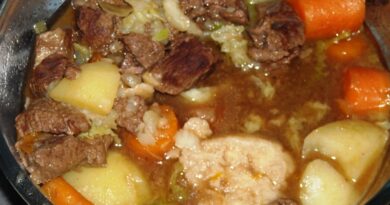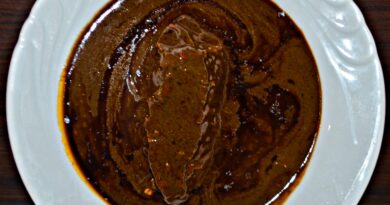Tabil
Unveiling the Flavors and History of a Tunisian Spice Blend
Introduction
In the vast and diverse world of culinary delights, spices play a pivotal role in transforming ordinary dishes into extraordinary feasts. One such spice blend that stands out for its unique flavor profile and rich cultural significance is “Tabil.” Hailing from the North African nation of Tunisia, Tabil is more than just a seasoning – it’s a symbol of the country’s culinary heritage and a key ingredient in many of its traditional dishes.
Origins and History
The Roots of Tabil
Tabil, pronounced “tah-beel,” finds its origins deeply rooted in Tunisian cuisine. The word “Tabil” itself is derived from the Arabic term “taabil,” which means “to season” or “to spice.” This spice blend is an essential component of Tunisian cooking, and its history can be traced back for centuries.
Historical Significance
Tunisia’s strategic location at the crossroads of different cultures has influenced its cuisine throughout history. The blend of Berber, Arab, and Mediterranean culinary traditions has given rise to a unique and flavorful gastronomic experience. Tabil, with its distinct combination of aromatic herbs and spices, is a testament to this rich cultural tapestry.
The Anatomy of Tabil
Ingredients
Tabil is characterized by a harmonious blend of spices and herbs, each contributing to its unique taste profile. While there can be variations in the exact ingredients, a typical Tabil blend includes:
- Coriander Seeds: Provide a citrusy and slightly sweet flavor.
- Caraway Seeds: Add a warm, earthy note.
- Garlic: Imparts a pungent and savory taste.
- Chilies: Contribute heat and a hint of smokiness.
- Ground Cayenne Pepper: Enhances the spice level.
- Ground Cumin: Offers a warm and nutty undertone.
Preparation
The preparation of Tabil involves toasting the whole spices to release their essential oils and enhance their flavors. Once toasted, the ingredients are ground together to create a fine powder. The result is a fragrant and versatile spice blend that can elevate a wide range of dishes.
Culinary Applications
Versatility in the Kitchen
One of the remarkable aspects of Tabil is its versatility. It serves as a multipurpose seasoning, adding depth and complexity to various dishes. Some of the common culinary applications of Tabil include:
- Grilled Meats: Tabil is frequently used as a rub for meats, especially in grilling and barbecuing. It imparts a smoky and aromatic flavor to the meat, creating a tantalizing sensory experience.
- Stews and Tagines: In Tunisian cuisine, Tabil is a staple in stews and tagines. It adds layers of flavor to slow-cooked dishes, enhancing the overall taste without overpowering the other ingredients.
- Vegetarian Dishes: Tabil is not exclusive to meat-based dishes. It works wonders in vegetarian and vegan recipes, bringing a burst of flavor to legumes, grains, and roasted vegetables.
- Marinades and Sauces: Tabil can be incorporated into marinades and sauces, infusing them with its aromatic profile. Whether preparing a simple dressing or a complex sauce, Tabil can be the secret ingredient that elevates the dish.
Tabil in Tunisian Culture
Culinary Heritage
Tunisia’s culinary heritage is a vibrant tapestry woven with the threads of various influences. Tabil, as a quintessential spice blend, holds a special place in the hearts and kitchens of Tunisians. It represents a connection to tradition, a way of preserving the flavors of the past while embracing the present.
Celebrations and Gatherings
In Tunisian households, the preparation of Tabil is often a communal activity, especially during festive occasions and family gatherings. It is not just a spice blend; it is a cultural tradition passed down through generations, fostering a sense of identity and shared culinary experiences.
Tabil Beyond Tunisia
Global Recognition
In recent years, Tabil has gained recognition beyond the borders of Tunisia. Its distinctive flavor profile and versatility have caught the attention of chefs and home cooks worldwide. As international palates become more adventurous, Tabil is finding its way into kitchens far beyond the North African region.
Innovative Fusion Cuisine
Chefs around the world are incorporating Tabil into innovative fusion dishes, marrying its traditional roots with contemporary culinary trends. From Tabil-infused oils to Tabil-spiced desserts, the possibilities are endless, showcasing the adaptability and appeal of this Tunisian spice blend.
Conclusion
In the realm of spices, Tabil stands as a shining example of how a humble blend can encapsulate centuries of culinary tradition. Its roots in Tunisian culture and its expanding influence on global cuisine make Tabil a spice worth exploring and incorporating into your culinary adventures. So, the next time you embark on a culinary journey, consider adding a pinch of Tabil – a spice that transcends borders and brings the flavors of Tunisia to your plate.



